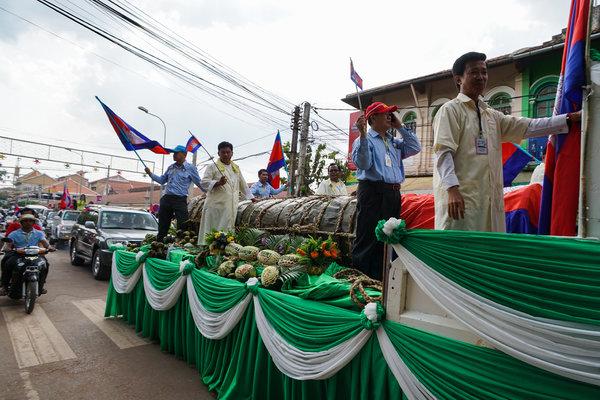
By Julia Wallace
Op-Ed: The New York Time
សេចក្តីវង្វេងក្នុងអំណាចនឹងការបោកប្រាស់ប្រជារាស្ត្រតាមរយៈការសម្ញែងនិងអូសទាញយុវជនអោយជ្រុលជ្រើមវត្ថុទាំងនេះដូចជាអន្សមយក្ស ក្រម៉ាយក្ស និងទូកយក្សជាដើម មិនមាននិរន្តរភាពយូរអង្វែងទេ។ កូនៗទាំងអស់ ដែលបានសិក្សារៀនសូត្រពីបច្ចឹមប្រទេស មិនបានយកចំណេះដឹងនិងក្រមសីលធម៍ពីបច្ចឹមប្រទេសមកកែទម្រង់ប្រទេសជាតិខ្លួនឡើយ។ ផ្ទុយទៅវិញម្នាក់ៗគ្មានក្រមសីលធម៍និងគ្មានវិជ្ជាជីវៈក្នុងខ្លួនសោះឡើយ។ កូនមួយជាមេទ័ពរបស់ជាតិ បែរជារំលោភលើក្រិតក្រមទ័ពមកបម្រើនយោបាយបក្សនិងធ្វើខ្លួនឯងជាសេនាធិការនយោបាយ។ កូនម្នាក់ទៀត លើកបន្តុបជាមេសមាគមយុវជន ដែលមិនមានក្រមវិន័យច្បាស់លាស់ថាជាសមាគមក្រៅរដ្ឋាភិបាល(NGO)ឬជាសមាគមអោយគណបក្សពីព្រោះខ្លួនគឺជាតំណាងរាស្ត្រម្នាក់របស់គណបក្ស តែធ្វើខ្លួនជាប្រធានសមាគមក្រៅរដ្ឋាភិបាល។ ដូចដែលពត៍មាននេះបានលំអិត គឺខ្លួនខិតខំសាបព្រោះមនោគមវិជ្ជាលើយុវជនច្រើនជាងបង្កើតគ្រឹះដល់យុវជនសំរាប់ជាធនធានមនុស្សរបស់ជាតិទៅអនាគត។ មិនតែប៉ុណ្ណោះ កូនចៅនិងសាច់ញាតិទាំងអស់គឺជាមេជំនួញនិងប្រធានអង្គការធំៗមានកាកបាទក្រហមជាដើម ដែលប្រការនេះគឺមានទំនាស់ផលប្រយោជន៌(conflict of interest) រំលោភអំណាច(power abuses) និងវិជ្ជាជីវៈជាតិ(national professionalism) ក៏ដូចជាសាបព្រោះគំរូស្មោគគ្រោកដល់ប្រទេសនេះជាខ្លាំង។
PHNOM PENH, Cambodia — First came the 8,900-pound sticky-rice cake, stuffed with mung beans and pork belly, displayed at Angkor Wat and heralded as “officially amazing” by Guinness World Records.
Then, in rapid succession, came a series of record-setting feats: The largest-ever performance of Madison dancing, with 2,015 participants. The world’s longest scarf (3,772 feet), woven over the course of six months and paraded through the streets of Phnom Penh, the Cambodian capital.
And in November, the world’s longest dragon boat (286 feet) was launched into the Mekong River and rowed by 179 oarsmen.
While this streak of oddball achievements might seem unconnected, they are all part of Prime Minister Hun Sen’s push to get young people excited about his aging regime, which he appears to consider essential to maintaining his grip on power.
“The government’s intentions here are rather transparent: They want to create images of visible enthusiasm for the nation and its leadership,” said Katrin Travouillon, a scholar of Cambodian politics at Australian National University.
The initial salvo in this campaign was the rice-and-pork colossus, unveiled at Angkor Wat in 2015, and touted as a modern-day marvel by the authoritarian Mr. Hun Sen, now 66, and his son Hun Many, 36, who hatched the idea as a showcase project for his new pro-government youth group.
Crowds cheered as a representative from Guinness World Records certified that the rice cake would take its place in the record book alongside Angkor Wat, the world’s largest religious structure and a source of enduring national pride.
“I am proud to be a child of Cambodia, and today we have achieved a giant sticky-rice cake, and the world will acknowledge that from now on,” Mr. Hun Many said in a triumphant speech at the event.

Two-thirds of Cambodia’s population is under 30, with no memory of the Khmer Rouge’s bloody rule in the 1970s, or the long years of civil war that followed. Many are weary of their country’s international reputation for genocide and political dysfunction.
So the country’s youth are less susceptible to Mr. Hun Sen’s traditional message that his party’s leaders are national heroes, deserving perpetual legitimacy because of the role they played helping to oust the Khmer Rouge from power in 1979.
The point was driven home to Mr. Hun Sen in emphatic fashion in 2013, after a near loss to an insurgent political party in an election that year. He has spent the past half-decade ramping up his efforts to appeal to the nation’s youth.
“The C.P.P. has to have recognized by now that a national identity forged on victimhood and gratitude is difficult to reconcile with the ideas and aspirations of the younger generation,” said Ms. Travouillon, referring to the ruling Cambodian People’s Party.
The new narrative emphasizes self-sufficiency and national pride, with Mr. Hun Sen publicly thumbing his nose at the Western donors who have poured billions of dollars of aid into the country.
A critical plank of this project has been a revival of the country’s youth corps, headed by Mr. Hun Sen’s youngest and most affable son, Mr. Hun Many. Officially, it is nonpartisan; in practice, its activities support the ruling party.
At a gathering of the youth corps in November, Mr. Hun Many urged participants to continue garnering world records.
Continue reading